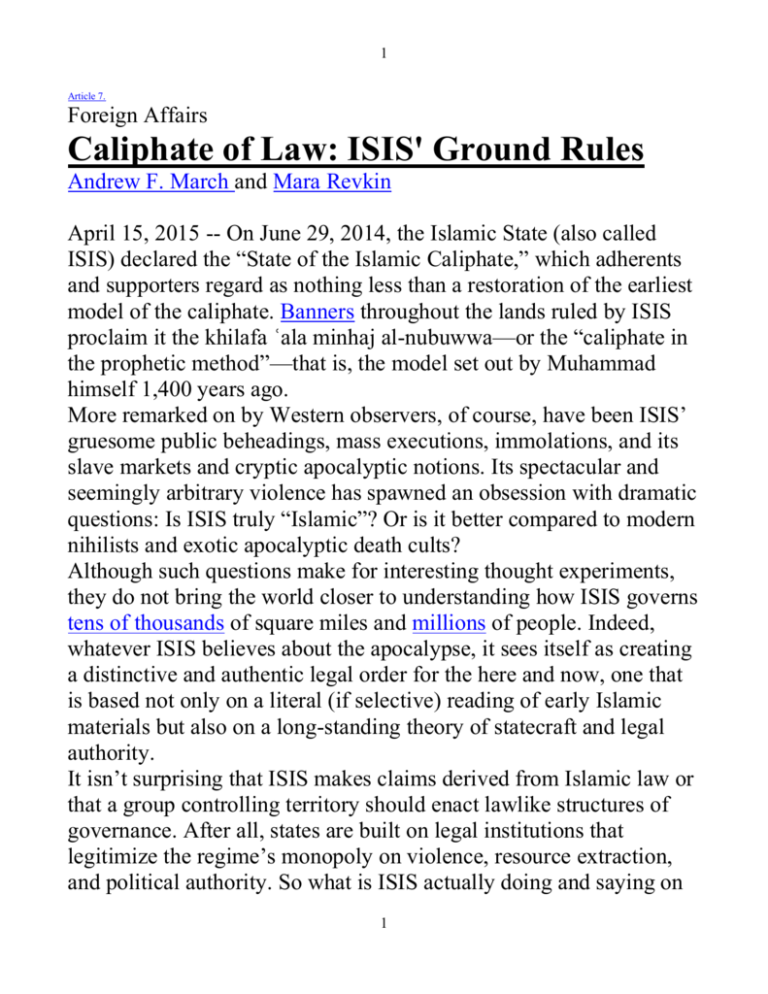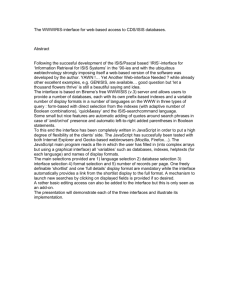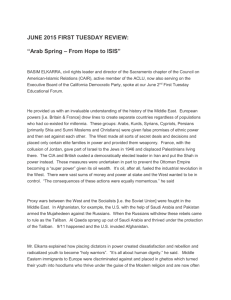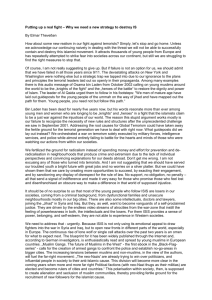Caliphate of Law: ISIS' Ground Rules
advertisement

1 Article 7. Foreign Affairs Caliphate of Law: ISIS' Ground Rules Andrew F. March and Mara Revkin April 15, 2015 -- On June 29, 2014, the Islamic State (also called ISIS) declared the “State of the Islamic Caliphate,” which adherents and supporters regard as nothing less than a restoration of the earliest model of the caliphate. Banners throughout the lands ruled by ISIS proclaim it the khilafa ʿala minhaj al-nubuwwa—or the “caliphate in the prophetic method”—that is, the model set out by Muhammad himself 1,400 years ago. More remarked on by Western observers, of course, have been ISIS’ gruesome public beheadings, mass executions, immolations, and its slave markets and cryptic apocalyptic notions. Its spectacular and seemingly arbitrary violence has spawned an obsession with dramatic questions: Is ISIS truly “Islamic”? Or is it better compared to modern nihilists and exotic apocalyptic death cults? Although such questions make for interesting thought experiments, they do not bring the world closer to understanding how ISIS governs tens of thousands of square miles and millions of people. Indeed, whatever ISIS believes about the apocalypse, it sees itself as creating a distinctive and authentic legal order for the here and now, one that is based not only on a literal (if selective) reading of early Islamic materials but also on a long-standing theory of statecraft and legal authority. It isn’t surprising that ISIS makes claims derived from Islamic law or that a group controlling territory should enact lawlike structures of governance. After all, states are built on legal institutions that legitimize the regime’s monopoly on violence, resource extraction, and political authority. So what is ISIS actually doing and saying on 1 2 the ground in the areas it controls? Ongoing research shows that ISIS is using Islamic law not simply to terrorize foreign hostages and nonMuslim groups, such as Christians or Yazidis, but also to establish a social contract with the Muslim population it aspires to govern. Despite suggestions that ISIS has “peaked” or is already in “decline,” its concern for establishing a law-based political order indicates that the group has aspirations for long-term governance—aspirations that should be taken seriously. FOUNDING PRINCIPLES ISIS aims to establish scrupulous legality for itself, from its very “constitutional” foundations to its narrowest public policies. This process, in fact, began up to a year before the declaration of the caliphate in a series of texts laying the groundwork for the future state, and it continues today with administrative guidelines for groups and individuals that wish to pledge allegiance to the caliphate. Allegiance (bayʿa) documents are frequently published online and reveal a consistency in language and substance. Here, three points are worth noting. First, these texts aim to prove that Muslims have an unavoidable religious obligation not just to create any ordinary state governed by sharia but to restore the specific office of the caliphate. “Without the condition of the caliphate being realized,” ISIS clarified in its official public declaration of the caliphate, “all power is simply worldly kingship, domination and governance, accompanied by destruction, corruption, injustice, coercion and fear, and the degradation and decline of humans to the level of animals. This is the truth of the succession to God, for which God has created us.” Second, the group takes pains to justify the legality of Abu Bakr al-Baghdadi’s own personal election to the office. The doctrinal basis for this was laid at least a year in advance, for example in the document “Madd al-ayadi li-bayʿat alBaghdadi,” which was released July 22, 2013. That work describes 2 3 the classical conditions of eligibility for the caliph and then outlines Baghdadi’s fulfillment of them. Finally, ISIS leaders appear bent on avoiding some of the problematic features of modern Islamic lawmaking—namely, the ubiquitous tendency to issue codes of law and formal constitutions. Instead, the group has refused to codify any but the most widely known Islamic legal rules in order to avoid the emulation of modern nation-states. For ISIS, God’s law can already be found in the primary texts of revelation (with some support from medieval scholars where necessary), and it is the job of worthy judges to enforce it. Likewise, the caliph is seen as a custodian of divine law. His power is not portrayed as absolute, but he does have plenty of room to issue laws and policies. The system follows a classical Islamic theory of statecraft known as siyasa sharʿiyya. The term means “religiously legitimate governance,” but it implies more than just the application of formal sharia. Instead, it sets up a kind a dualistic model of law and governance. On the one hand, the system requires sharia courts for the application of Islamic legal rules in routine matters for which specific rules exist. But it recognizes that rules do not exist for every conceivable matter. And so the “siyasa sharʿiyya” theory posits that there are legitimate authorities—from market inspectors to military commanders and governors up to the caliph himself—that have the right to make lawlike decisions as long as those decisions are issued solely with the welfare (maslaha) of the Muslim community in mind and do not violate known laws. Within the framework of this theory, ISIS has established both sharia courts for unexceptional Islamic rulings over civil and some criminal matters and other kinds of courts that deal with military discipline or complaints from the population, including grievances against ISIS fighters (many of whom have actually been punished after such complaints). 3 4 LAW AND ORDER Within the siyasa sharʿiyya system, ISIS has been able to create rules and regulations to govern civilians, discipline its own fighters, and control territory. Such regulations often deal with matters that were not directly addressed by the revelatory texts (for example, fines for traffic violations). But they are ultimately anchored in an Islamic legal order nonetheless. For evidence, look to four of the most important areas of regulation—citizenship, land, trade, and war. The ISIS legal system purports to establish a relationship between government and the people that is based on accountability and Islamic justice, according to which the caliph himself can be removed by the Shura council if he fails to fulfill his obligations. The theory of the caliphate implies a law-based social contract with reciprocal obligations and rights between the caliph and the people, whom ISIS calls “subjects” (riʿaya, or simply “the Muslims”). The group issues a variety of rules and regulations designed to enforce those subjects’ compliance with their obligations. It also guarantees a limited number of legally enforceable rights—for example, the right to file complaints or charges against ISIS combatants or officials. As one propaganda brochure from Raqqa states, “The Islamic State is just and there is no distinction between a soldier and a Muslim [civilian]. In the sharia courts, all are held accountable and no one has immunity.” Additionally, ISIS claims that its subjects have the right to equal treatment before the law of God: “The people are as equal as the teeth of a comb. There is no difference the rich and the poor and the strong and the weak. The holder of a right has redress, and the grievance of an injured party will be answered.” Different legal obligations apply to Muslims and non-Muslims. Christians and Jews are allowed to live and work in the caliphate in exchange for paying an annual tax, which in Iraq was recently set at a rate of four gold dinars for the wealthy, two dinars for middle4 5 income, and one dinar for the poor. At the same time, ISIS has also developed legal justifications for the extermination of certain classes of non-Muslim minorities within the caliphate’s territory. Prior to the capture of Sinjar in Iraq, ISIS claims, its religious scholars conducted research on the Yazidis to determine whether they should legally be considered an unbelieving group “by origin” (asli) or one that was originally Muslim and only later apostatized. Ultimately, ISIS determined that the Yazidis were a polytheist group by origin and therefore concludes, “Unlike the Jews and Christians, there was no room for jizyah payment … and [the Yazidis] can only be given an ultimatum to repent or face the sword.” Of course, all residents of the caliphate, whether Muslim or nonMuslim, are prohibited from engaging in criminal activity or other forms of misconduct. ISIS publishes specific guidelines for the punishment of crimes that are specifically defined in the Koran (known as “hadd crimes”), but it also metes out discretionary punishments (“taʿzir”) for ones that are not. Based on data collected on ISIS courts and policing activities, we have identified three main categories of punishable crimes and misconduct: crimes threatening the state and public order, including espionage, treason, collaborating with foreign interests, embezzlement of public funds; crimes against religion or public morality, including adultery, sodomy, blasphemy, apostasy, pornography, selling or consuming drugs and alcohol, and witchcraft; and crimes or torts against particular individuals, which include theft, burglary, home invasion, rape, armed robbery, and murder. In addition to rules regulating subjects’ behavior, ISIS issues rules designed to expand the population and socialize children with Islamic values. Such regulations include mandatory education through the ninth grade (girls and boys are educated in different schools) and prohibitions on the use of birth control. These rules are generally 5 6 oriented toward increasing the population of the caliphate and producing obedient subjects who can be easily governed and conscripted as fighters. In terms of land laws, establishing a legal basis for territorial conquest is important to ISIS for both ideological and practical reasons. First, on an ideological level, ISIS purports to be reclaiming lands that were unlawfully expropriated from Muslims by Crusaders and colonial powers. It needs a legal foundation to justify those claims. Second, on a practical level, ISIS is attempting to establish territorial control under conditions of war in which land rights are at best uncertain and at worst a subject of violent conflict. It is impossible to govern such contested territory without a legitimate claim to sovereignty and rules for property ownership and land use. Accordingly, ISIS has articulated elaborate rules for property and land. For example, it has laws for the seizure of war booty, stating that jihadists should take only what is necessary to advance the objectives of jihad. ISIS has also issued a fatwa justifying the expropriation of agricultural businesses that previously belonged to apostates before the group captured them, and additional regulations for the distribution of such confiscated property as charity for the poor and to recruits. One propaganda magazine illustrates the importance of property as an incentive for recruitment: “Do not worry about money or accommodations for yourself and your family. There are plenty of homes and resources to cover you and your family.” Meanwhile, ISIS has also attempted to regulate agriculture and environmental protection. For example, a recent announcement from Deir ez-Zor in Syria prohibits fishermen from using electrical current, poison, or dynamite to kill fish, out of concern that such methods cause congenital defects in minnows and are also detrimental to the health of human consumers. 6 7 In terms of trade law, ISIS makes clear that the preferred vocation for subjects is jihad and that it frowns on peaceful alternatives such as farming. Propaganda advises Muslims to earn a living “by performing jihād and then taking from the agriculture of his kāfir enemies, not by dedicating his life to agriculture like his enemies do.” However, in recognition of the reality that the caliphate’s economy will rely on other forms of productive work, the group has developed rules to regulate labor and commerce. It requires fighters who “abandon jihad and work to improve their wealth and land” to pay taxes that will further the fight. Taxation is thus a justification for otherwise impermissible forms of commerce, and it also serves to reinforce the concept of a social contract in which residents of the caliphate perform obligations in exchange for assurances of accountable government and legally enforceable rights. In some places, the group taxes at a rate of 2.5 percent on real estate, clothing, food, vehicles, and more. In addition, ISIS sets prices for housing rents, medications sold at pharmacies, and childbirth operations performed in its hospitals, and has even issued a fatwa requiring that the price of counterfeit goods be lower than the price of the authentic product. Finally, there are the rules related to war. Here, ISIS claims to follow Islamic laws of armed conflict. And, according to ISIS propaganda, the caliph is personally obligated to ensure combatants’ compliance with them: “The leader is required to ensure that he and his soldiers are held responsible for the rights that Allah has made obligatory and the limits that He has set.” ISIS has published guidelines, either as official fatwas or legal opinions authored by ISIS-affiliated clerics, specifying the conditions under which enemy combatants may be targeted, tortured, mutilated, or killed as well as rules governing the ransom of non-Muslim hostages. So ISIS can claim that its combatants are acting lawfully according to the group’s own rules, 7 8 even though the United Nations has reported that “ISIS is violating binding international humanitarian law.” ISIS also has laws for the provision of security guarantees, called “aman documents,” for journalists and humanitarian workers seeking access to ISIScontrolled areas. Rules for the treatment of prisoners and slaves do include certain limitations, such as a prohibition on separating a mother from her young children, but they also permit sexual slavery as a legally permissible alternative to adultery. ISIS also regulates and censors fighters’ communication through, for example, a decree that prohibits combatants from publishing photographs of enemies killed in battle and a ban on using Apple products and other GPSenabled devices that, ISIS leaders worry, the U.S.-led coalition could use to help target airstrikes. COURT ORDER ISIS enforces its rules and regulations through its internal security sector and two separate police units. One of the police forces, called the “Islamic police,” is responsible for ordinary law enforcement and public safety. Its responsibilities include conducting inspections at checkpoints and issuing tickets for traffic violations. According to ISIS propaganda, this force contains legal specialists who report to a senior jurist, who in turn serves as a direct link to judges in the courts. When dealing with interpersonal disputes, such jurists will first attempt to resolve the conflict through informal mediation. But if mediation fails, the jurist can refer the dispute to an ISIS court. The second police force is a religious morals unit called the “hisba.” The mandate of this body is to “promote virtue and prevent vice to dry up sources of evil, prevent the manifestation of disobedience, and urge Muslims toward well-being.” Activities include enforcing the prohibition on commercial activity during prayer time, responding to reports of drug or alcohol use, and destroying banned materials (including musical instruments, cigarettes, or polytheistic idols). The 8 9 religious police are also responsible for investigating alleged violations of sharia and may refer more serious crimes to courts. ISIS has established official courts in Syria, Iraq, and Libya, and proto-courts are reportedly operating in the recently annexed Sinai province as well as border areas of Lebanon. Although ISIS claims to control territory in parts of Algeria and Nigeria through its annexation of other jihadist groups (Jund al-Khilafah and Boko Haram) that have pledged allegiance, courts have not been established in these areas—yet. But as ISIS begins to communicate instructions and guidance to its distant franchises, these groups may come under pressure to establish the kinds of legal and judicial institutions that characterize ISIS governance in Syria and Iraq. In general, the ISIS judiciary is organized into three main branches: a division for complaints (mazalim), including grievances against ISIS public officials and combatants; Islamic courts, including the Supreme Islamic Court located in Mosul, which deals with violations of ISIS laws and government matters; and the Diwan al-Hisba, which adjudicates crimes or misconduct referred by the morality police. ISIS regulates its judiciary through a top-down bureaucratic chain that starts with the Sharia Council, which is headed by Baghdadi himself. Under the authority of the Sharia Council, each wali (the governor of a regional administrative division called a wilaya) oversees a sharia deputy who in turn supervises the wilaya-level sharia commission. The sharia commissions (hayʾat al-shari‘a) are responsible for overseeing courts and the work of judges. ISIS disciplines and even executes its own judges when they refuse to support the caliphate’s official position on legal questions. For example, one judge was removed from his post and is expected to face trial for voicing opposition to the legal ruling justifying the immolation of a Jordanian pilot. Another ISIS judge was “disappeared” in Deir ez-Zor after he objected to the torture of 9 10 prisoners in ISIS jails. Still others have been executed on charges of treason and collaborating with foreign governments. In addition to punishing its own judges, ISIS has executed independent jurists when they issue unauthorized fatwas that are deemed too radical. For example, in one case, ISIS executed one such jurist after convicting him of spreading fitna (strife or discord) by advocating excessive “takfīr” of other Muslim jihadists (takfir, in Islamic law, is the practice of declaring someone to be an apostate and therefore a legitimate target for killing). ISIS operates numerous prisons in connection with its court system. Although precise statistics are not available, Amnesty International reported in December 2013 that ISIS was operating at least seven detention facilities in Raqqa and Aleppo provinces alone. One of the functions of these prisons is to rehabilitate criminals for eventual reintegration into society; ISIS employs clerics in prisons to visit with and educate the inmates. Although the organization claims to guarantee certain rights for detainees, including a pretrial detention limit of seven days before the accused person is entitled to a court hearing, reports of arbitrary arrests and torture in prisons are widespread, and in some ISIS-controlled areas, civilians have staged protests to demand the release of detainees. LAWFARE It is too early to tell how long the caliphate will last, but its radicalism—the group’s effort to base its authority on what it thinks is the “prophetic method”—seems more easy to sustain in times of war and emergency. In peacetime, ISIS would have only two paths: first (and more likely), it could move toward the increasingly arbitrary corrupt rule of warlords governing an impoverished and enclosed territory; and second, it could become an increasingly “normal” state, in which the simplicity of rules and institutions 10 11 plucked out of early Islamic history gives way to bureaucratic administration and positive law. For now, ISIS’ ideas have filled a hole both in governance in Iraq and Syria and in the global Salafi-jihadist political imagination. In the long run, the ISIS legacy will be not only its gruesome record of sadistic violence but also its profound challenge to existing Islamist thinking. It is a rebuttal to the long-standing Islamist view that modern, centralized states can be “Islamized” within their existing institutions merely by substituting codified positive laws with codified “Islamic” laws. It also contravenes the al Qaeda–style strategy of spectacular violence directed at Western and Muslim targets without long-term governance of territory in which Muslims are the majority. It would not be surprising if ISIS’ legal strategy enhances its own global prestige at the expense of al Qaeda and gives inspiration to groups seeking to govern immediately over whatever territories they manage to seize by establishing sharia courts, hisba patrols, and military and administrative courts. Authority in these territories can be ratified after the fact as “delegated” from the caliph in Mosul. In the end, victory in the jihadist imagination will look less and less like the glorious toppling of dictators in national capitals such as Amman, Cairo, and Rabat, and more and more like the declaration of liberated wilayat until those isolated patches are woven into a single mantle covering the entire ummah. ANDREW F. MARCH is Associate Professor of Political Science at Yale University. MARA REVKIN is a J.D./Ph.D. student in political science at Yale University and Yale Law School. 11




